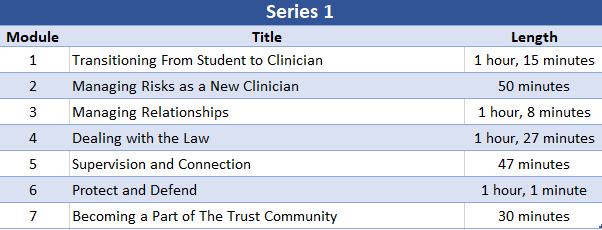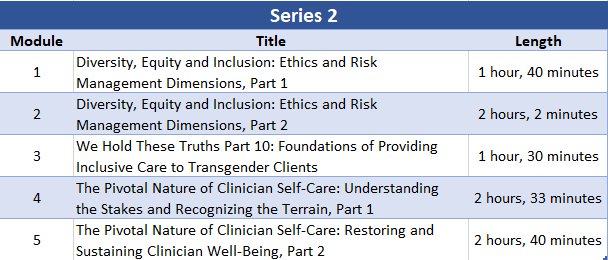
Module 1: Transitioning from Student to Clinician
In this module, we focus on your transition out of graduate school and internship training and into professional clinical practice. We highlight common fears and concerns for early career psychologists and provide concrete, practical considerations and guidance for your next steps.
Objectives:
- Describe common fears and issues that arise for new clinicians.
- Summarize several strategies for mentally preparing for the transition from student to early career professional (ECP).
- Identify several practical considerations and strategies when pursuing employment opportunities.
Module 2: Managing Risk as a New Clinician
In this module, we introduce you to the concept of risk management and how it differs from basic psychology ethics. We give you a crash course in risk management by walking you through our top three risk management strategies for all areas of psychological practice. This module provides a foundation for the rest of the modules in this program.
Objectives:
- Summarize the basic elements of good risk management in psychological practice.
- Describe several critical components of a comprehensive informed consent process.
- Summarize the primary purpose of maintaining clinical records.
- Identify several high-risk situations that may require consultation.
Module 3: Managing Relationships
In this module, we discuss the various complexities and dimensions of our relationships with clients. This includes interactions with clients before, during, and after the professional relationship, in-person and online, and how to navigate your own feelings about your clients.
Objectives:
- Distinguish between boundary crossing and boundary violations.
- Identify several common multiple relationship scenarios.
- Recognize high risk client and challenging client populations.
- List four steps for appropriate clinical termination.
Module 4: Dealing with the Law
In this module, we provide an overview of important legal concepts, terms, and processes that frequently involve psychologists. We explain the differences between various types of legal requests for client information and provide several decision-making roadmaps for minimizing one’s risk when responding to these requests.
Objectives:
- Distinguish between different types of legal requests for information.
- List steps to be taken immediately upon receiving a subpoena.
- Describe several strategies to reduce risk when providing testimony.
- Identify three considerations when asked to write a letter on a client’s behalf for a legal purpose.
Module 5: Supervision and Connection
In this module, we delve into the complexities and necessary elements for nurturing a positive and productive supervisory relationship. We identify potential risks for both supervisor and supervisee and explain the importance of creating a supervision agreement in order to mitigate those risks. We also highlight the importance of connection in various ways throughout one’s psychology career, including through consultation.
Objectives:
- Distinguish between supervision and consultation.
- Describe several domains of supervisor competence.
- List three risks for supervisors when taking on a supervisee.
- Identify necessary elements of informed consent between a client and supervisee.
- Recognize potential risks of practicing in an isolated manner.
Module 6: Protect and Defend
In this module, we consider various developmental stages of your psychology career, focusing on getting licensed, staying licensed, and defending against potential complaints or lawsuits. We highlight various domains of competence and review steps to take with an impaired or unethical colleague. We also review licensing board complaint and malpractice lawsuit processes in depth. Finally, we emphasize the importance of self-care as a risk management strategy.
Objectives:
- Identify three questions to consider prior to seeking licensure.
- Compare and contrast licensing board complaints versus malpractice lawsuits.
- List three things to do and three things not to do when you receive notice of a licensing board complaint.
- Identify several common causes of impairment and/or unethical behavior by colleagues.
- Explain the importance of self-care as a risk management strategy.
Module 7: Becoming a Part of The Trust Community
In this module, we provide an overview of the many resources available for psychology students and ECPs when you become a Trust policyholder. We explain the differences between policy coverage options, as well as highlight the importance of individual coverage at different stages of your psychology career. In addition, we review some of the specific products and tools developed by the Trust SECP Advisory Committee.
Objectives:
- Describe the importance of professional liability coverage for students and ECPs.
- Distinguish between policy options.
- Identify several Trust online resources designed specifically for students and ECPs.
- List several ways to be prepared for an Advocate 800 consultation call.

Module 1: Diversity, Equity and Inclusion: Ethics and Risk Management Dimensions, Part 1
Objectives:
- Define four central concepts in diversity, equity and inclusion.
- Identify three aspects of power differentials that affect patients/clients and clinicians at the interpersonal and structural level.
- Summarize three criticisms of the APA Ethics Code by BIPOC Psychology Associations.
- Describe two ways in which Euro-American definitions of “harm” and “good” differ from the definitions by traditionally marginalized and BIPOC communities.
Module 2: Diversity, Equity and Inclusion: Ethics and Risk Management Dimensions, Part 2
Objectives:
- Explain two methods of engaging in more productive conversation regarding diversity.
- Define two reasons to engage in “calling out” versus “calling in.”
- Identify three culturally assumptions underlying Euro-American systems of regulation and justice.
- Describe four culturally and ethically grounded risk management strategies.
Module 3: We Hold These Truths Part 10: Foundations of Providing Inclusive Care to Transgender Clients
Transgender and gender diverse (TGD) people seek psychotherapy for a variety of concerns. Yet, the TGD community consistently reports having poor experiences with mental health care. Some of the reasons for this are providers’ lack of knowledge of affirming language, transgender identities, intersecting identities, common life experiences, and clinical concerns of this community. The mental health disparities experienced by the TGD community further highlight the need for more training for psychologists to provide gender affirming care to TGD individuals.
This module aims to bridge this gap by providing participants with the introductory knowledge and skills necessary to begin providing affirming care to TGD individuals. Participants will also be given the tools to increase their awareness of and challenge their own biases related to TGD people. Participants will leave this webinar with an understanding of how to continue their education about working with TGD individuals and cultivating a gender affirming practice.
Objectives:
- Learn key terminology and issues experienced by transgender and gender diverse (TGD) people.
- Develop an understanding of common clinical concerns experienced by TGD individuals.
- Explore how intersecting identities impact TGD people.
- Increase awareness of and begin to challenge biases that may have implications for interactions with TGD people in a therapy setting.
- Cultivate basic skills necessary to provide gender affirming mental health services to TGD individuals.
Module 4: The Pivotal Nature of Clinician Self-Care: Understanding the Stakes and Recognizing the Terrain, Part 1
This module examines self-care in detail – what it is and how it is essential to mental health treatment of all kinds. We will consider the ethical and regulatory obligations of all psychologists to proactively attend to self-care, explore its vital link to professional competence and clinical effectiveness, and situate self-care as one of the most essential risk-management practices available to clinicians.
In addition, we will look closely at the terrain of clinician distress, burnout, compassion fatigue, and vicarious traumatization. Relevant research and distinguishing features of each of these experiences will be examined, as will warning signs and indicators of potential impairment. In doing so we will consider the unique manifestations of these factors in our world today and the implications for providers and patients/clients alike. Lastly, a self-care continuum will be presented, with an expanded focus on wellness and a beginning look at possible pathways to clinician well-being and thriving.
Objectives:
- Define self-care.
- Identify the connection between effective self-care and psychologist’s ethical obligations, competence, and clinical effectiveness.
- List at least five risks of not appropriately tending to self-care.
- Explain components of distress, burnout, compassion fatigue, and vicarious traumatization and how to recognize each of these.
- Describe the self-care continuum and various pathways to improving clinician well-being.
- Apply self-care as a risk management strategy.
Module 5: The Pivotal Nature of Clinician Self-Care: Restoring and Sustaining Clinician Well-Being, Part 2
This module focuses more specifically on how clinicians can restore and sustain their own well-being. It will start by addressing some of the barriers to effective self-care, and will emphasize the critical importance of transitioning the concept of self-care into living practices of daily life. A discussion of this personal integration will include self-monitoring strategies and the use of specific self-assessment tools, while also addressing the limitations of self-assessment if applied in the absence of invaluable interpersonal connection and support.
Specific techniques for moving out of burnout and addressing compassion fatigue and vicarious traumatization will be covered. The essential role of self-compassion in the promotion of wellness will be addressed, as will key components of resilience. Suggestions will be made for ways in which clinicians can move toward greater self-revitalization and well-being, both in an effort to support their own mental health and functioning and to enable clinicians to more effectively serve those with whom they work.
Objectives:
- Describe at least three barriers to effective self-care.
- Explain the concept of ‘lived’ self-care.
- Identify two or more strategies for self-monitoring/self-assessment and articulate the limitations of self-assessment only.
- Describe at least five specific strategies or techniques for moving out of burnout and related conditions and increasing self-revitalization and resilience.
- Explain the role of self-compassion in the promotion of wellness and identify key components of resilience.
- Design a personalized self-care plan.